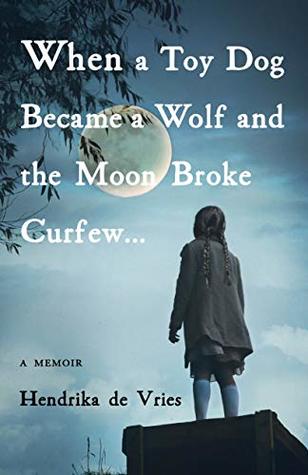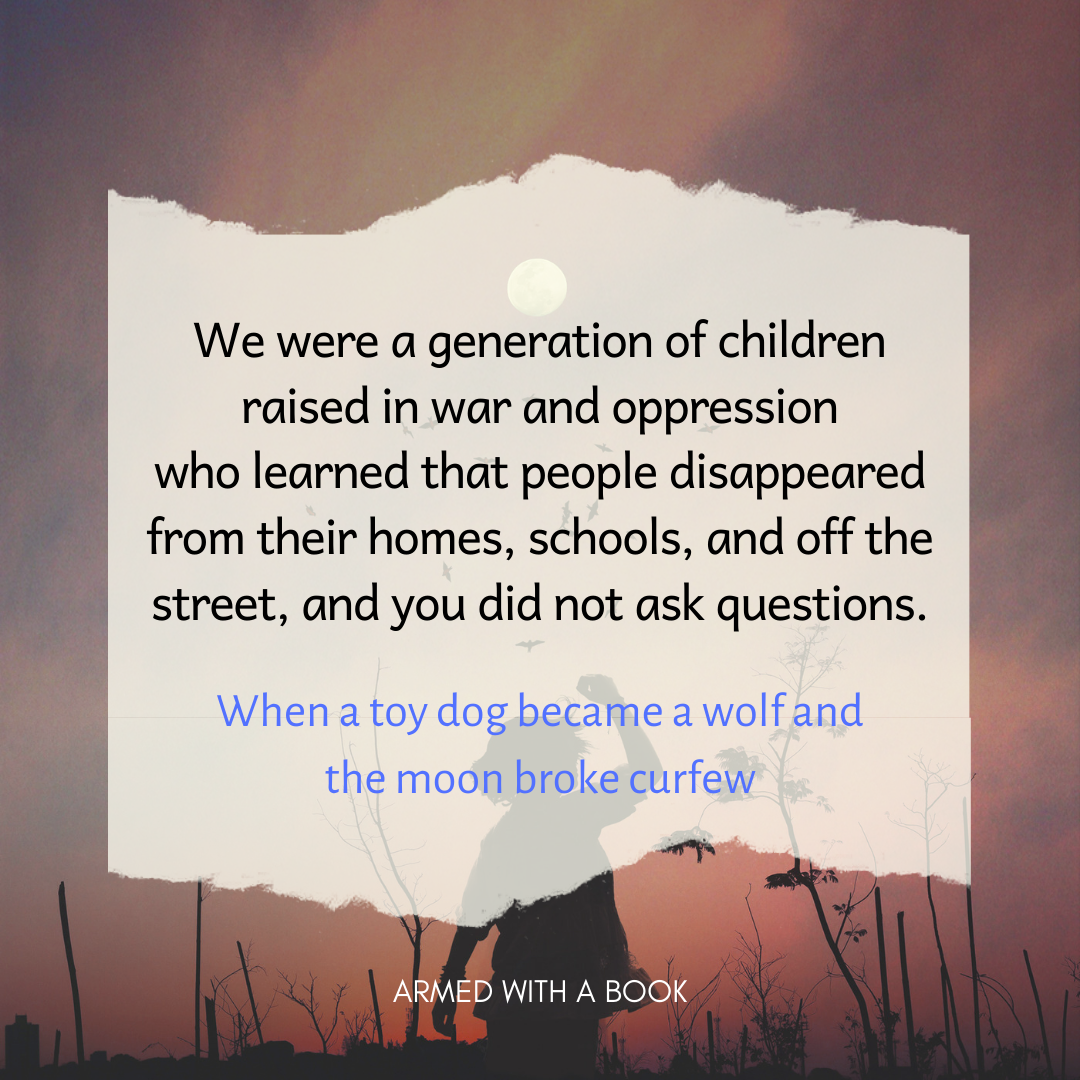When a toy dog became a wolf and the moon broke curfew – is that not the most imaginative title ever? What kind of image does the book title create in your mind? Looking at the cover, the story seems to be about imagination taking flight, and in some ways, Hendrika de Vries‘ memoir, of her time in the Netherlands, indeed touches upon the power of imagination and storytelling. I have a read many books centred around the world wars and this one is definitely my favorite. Let’s take a look at the synopsis!

Born in the Netherlands at a time when girls are to be housewives and mothers and nothing else, Hendrika de Vries is a “daddy’s girl” until her father is deported from Nazi-occupied Amsterdam to a POW camp in Germany and her mother joins the Resistance. In the aftermath of her father’s departure, Hendrika watches as freedoms formerly taken for granted are eroded with escalating brutality by men with swastika armbands who aim to exterminate those they deem “inferior” and those who do not obey.
As time goes on, Hendrika absorbs her mother’s strength and faith, and learns about moral choice and forced silence. She sees her hidden Jewish “stepsister” betrayed, and her mother interrogated at gunpoint. She and her mother suffer near starvation, and they narrowly escape death on the day of liberation. But they survive it all—and through these harrowing experiences, Hendrika discovers the woman she wants to become.
The Short Take – From Goodreads
I love books about historic events that we learn about as facts in school, and hardly ever learn the actual human experience behind it. We learn in school about the war times but we never really learn about the after. When a toy dog became a wolf and the moon broke curfew is a gripping memoir about living in the midst of war. Henny is five when war takes her father from the family as a Prisoner of War, as the Netherlands are occupied by Nazi Germany. Coming to terms with the social situation as a child, watching her mother be strong for their family of two, with unwavering faith the he will be back, Henny faces situations where she not only rethinks the role that religion plays in their lives, but also the position of women and the bounds created in times of war.
This is a touching tale of a little girl that misses her father and learns extensively from her strong mother. This novel, through the eyes of Henny, from the age of 5 to 13 years, does an amazing job of personalizing the experience and bringing awareness to the undiscussed aspects of war.
I found the narrative related to after the war the most fascinating. I had never thought about what happens when men return to their families, older and with experiences that they cannot speak about. At the same time, we have the women who have had trying experiences of their own, and become independent.
I gained new knowledge about living in and after war times, about the Silent Generation, the necessity to move countries when the war was over, and much more. In the midst of all this, was the heroism of the women who helped their families and whoever they could aid, survive. Henny’s mother is a woman to be admired.
The Long Take – Themes for Thought
Did you know that the generation born during the Great Depression and the World War II are also known as the Silent Generation?
They came of age just too late to be war heroes and just too early to be youthful free spirits.
Lifecourse
When a toy dog became a wolf and the moon broke curfew is a complex book, touching on a number of issues that the Silent Generation faced, from belief in religion, dealing with food scarcity during war times, to growing with the strength of her mother and the hope that her POW father will return home safely to them. It is about helping people in need, while at the same time, trying very hard not to get into trouble for doing so. The Second World War was a dangerous time, and there is so much about the daily life at that time, coming out now through the efforts of authors like Hendrika.
On the power of Teachers and Storytelling
Henny was always surrounded by storytelling. Her father would tell her stories she would get lost in. She would read books that took her to other worlds. But it was her teacher, Miss Hoffman, from grade 1, that brought storytelling into the classroom, and helped the kids escape from the horrors they were starting to witness at home. Later, in grade 6, Henny found a mentor in Miss J.H. de Wilde.
As a trained teacher myself, it always warms my heart when someone is able to name the teacher who impacted their lives. As an avid reader, the importance of storytelling in learning and developing a love for reading is highlighted in Henny’s school experience.
While the kids grew up in terror, they had to find the strength in themselves and their parents. For Henny, her imagination helped her keep hope that her father will return to her and that life might be able to go back to what it was before. And once he was back, imagination again helped her come to terms with the ways in which life would never be the same.

On changed roles and life decisions
We have all heard about the Post-traumatic Stress Disorder among war veterans, but there is so much more that went on after the World War ended and the soldiers and prisoners returned home. Before the war, men were still the head of the households, working and earning for the family. When the war started, they took the lead and left homes to defend their countries, or they were captured in the name of their country. Now it was up to the women to survive and keep the kids safe, and, as a result, women like Henny’s mother, became leaders.
The men came back to a new world where the women had learned to survive without them. Dealing with not just the experiences at the camps and on the ground, they also had to face the change in their household roles. Henny’s story is a personal look at the what happened when her father did return to the family after the war. Through Henny’s eyes, I heard the account of readjusting, while at the same time, realizing the life was never going to be the same again. Too much had happened.
With this realization, also came the sad acknowledgement that home wasn’t the same anymore.

I greatly appreciate the advanced reader copy that I received from the publisher from NetGalley and I am honoured to learn about Henny’s experiences. Hendrika beautifully portrays the thoughts in the mind of her younger self as the war time forces her to grow up, and internalize incidents that she is only able to give deeper meaning in later years. If you are interested in history, particularly World War II, you should read this book. I am sure you it will be a cherished story.
** When a toy dog became a wolf and the moon broke curfew is now out in stores so get a copy and let me know what you think! Let’s have a book-discussion! **
Amazon Print
Amazon Kindle
I plan to write another article, going over the discussion questions. Also, stay tuned for an exclusive interview with Hendrika about her book, life, writing and more.
Check out other book thought articles on Armed with A Book here. Thanks for reading! 🙂
Cover image: Photo by Greg Rakozy on Unsplash

This sounds like such a great book! Adding to my list! Thank you Kriti for how much you put into your reviews.
Thanks, Camilla. 🙂
And … OOPS!! Didn’t remember that I’d already commented on this! I must have really liked this post! HA! Sorry for the double comment!
Lovely review Kriti. This sounds like a wonderful book! Thanks for letting us know about it!
Just wanted to let you know that I requested our local library purchase this wonderful book … And, they did! It’s now in my ‘to be read’ pile.
That is amazing, Camilla! Can’t wait to hear your thoughts on this 🙂
Wow this book sounds absolutely fascinating. Mothers/women are entirely underrepresented in Holocaust literature, it’ll be wonderful to read more about the struggles they went through when the men went away.
It was such an amazing book, Savannah! I highly recommend it. I hope you get a chance to pick it up! 🙂